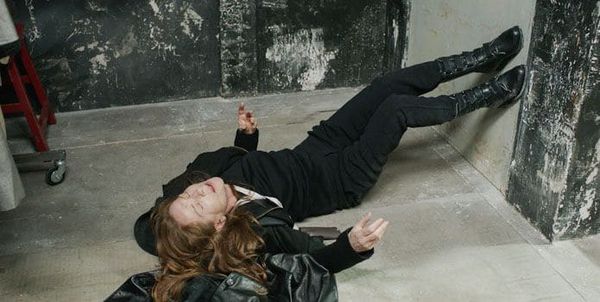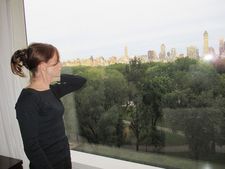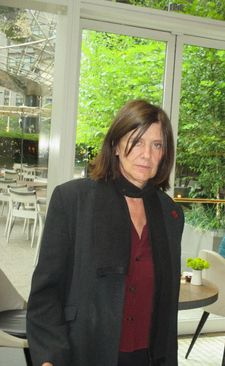 |
| Isabelle Huppert as Maud: 'the challenge was to convey the emotion as long and as strongly as possible…' |
Maud, played by Isabelle Huppert, who is formidable in every scene and gesture, wakes up one morning under fresh white sheets and notices that there is something wrong with her left arm. She tries to get up and collapses. It takes all her strength to reach the phone. "Half my body is dead," she says and realises that "nothing will ever be the same".
Anne-Katrin Titze: We last spoke in New York when you were doing the Sarah Kane play 4.48 Psychosis. I just thought about it and wondered if there is a connection to Abuse of Weakness. Both play and film are about waking up to a terrifying reality.
 |
| Isabelle Huppert looking out onto Central Park Photo: Anne-Katrin Titze |
AKT: True. I was only referring to the beginning, which is everybody's worst nightmare. Waking up and realising that your body without warning doesn't obey you any more.
IH: I didn't even want to think about it. If I had thought about it the way you describe it, it would have been very uneasy for me to do. I took it more abstract in a way. Much more like a metaphor of weakness, of any human weakness. Because it's that much stylised and there is no real drama around the illness itself. Of course, when it happened it's very painful and she goes through all the varying stages to get better, to improve her physical handicap. Very soon in the film you forget about the handicap, not forget, but there is nothing left over in the face. There is only this hand thing and the limping and it's more for me like a metaphor.
AKT: Catherine told me yesterday that she said to you "It's now or never."
IH: Working together? Yes! We've known each other for so many years. For various reasons it never happened before. I think she very strongly wanted to work with me. And so did I. Also because we've known each other for such a long time and are such close friends, when she asked me it was all very natural to me. Much more than if she had asked an actress she hadn't met before. It made the whole thing more scary but also I was close to Catherine when it happened to her. I was with her the very first days after the stroke. In a way it was no big deal for me to do it. It was very technical, very normal. It sounds very cold the way I am describing it but it's not. It's also Catherine's own attitude towards what she is going through. She doesn't put any drama around it which is very brave and also her own way to have a totally normal life as much as she can. Plus, the movie is the movie. It's a film, a story about desire, about power about all sorts of things.
AKT: Catherine does not rehearse beforehand. Did you meet your co-star Kool Shen [who plays Vilko Piran] before filming?
 |
| Isabelle Huppert on Kool Shen's performance as Vilko: 'Cold and witty at the same time and really dangerous.' |
Vilko provokes Maud, jumps on her bookshelves, calls Nietzsche "my master," struts like a peacock, and tells her he will only star in her movie "if the ending is good."
AKT: The way you are using your hands right now. That is like his performance. He is circling around you. A beautiful choreography for the two of you. You never fully know who is the prey.
IH: He was so perfect for the role. Cold and witty at the same time and really dangerous.
AKT: His eyes look extremely dangerous at times. How much does he resemble Rocancourt [the real-life French conman on whom Vilko is based]?
IH: I don't know Rocancourt. I met him once by accident in a hotel. I've seen photos like everybody else. I'm not even sure I would recognise him. During the time the whole thing happened I wasn't seeing Catherine a lot. I never met her with him. You know, first she turned the story into a book, then into a screenplay, then a movie, so it's fiction.
Huppert's character and Breillat, in a cameo, cross paths in the hospital corridor, as though the director passes on the baton of understanding to the film and to us in the audience. Everything is different now.
AKT: It isn't her life although everything in the movie is so close to her life.
 |
| Isabelle Huppert on her and Catherine Breillat's style: 'Being dressed in black and a bit boyish.' Photo: Anne-Katrin Titze |
AKT: Which sections did you go to?
IH: She wanted to see paintings from the middle ages and through the 17th century. She said, "That's the only painting I am interested in." More than the 19th or 20th century. But I like that she really knows what she likes. With me, for example, she wanted my face or my neck to be in a certain attitude. It's more about poetry and frames.
AKT: I like how much with the structure she trusts that the audience will figure out what is going on. For example, the third time Maud collapses. We think, why doesn't she use the phone? Why does she bang with her feet against the door? It is revealed some time later. The question of "it was me - it wasn't me" did you prefer one direction to the other? Did you make up your mind?
IH: No. With repeating it that often, the challenge was to convey the emotion as long and as strongly as possible rather than to fall into something too mechanical. I wanted to be as natural as possible. Which is not obvious, unless you are completely insane or have completely neurotic behavior, which is not her. It's at the border of something very natural and a bit neurotic. She is a normal person when she says that. You really had to fill the scene up with a certain quality of truth.
AKT: It is up there with the best endings in terms of truth.
IH: Actually to say "it was me - it wasn't me - it was me", and make it believable each time she says that, and I say it ten or 12 times, that each time she means it, I had to be really there. Every time she says it she wants to convince herself of what she said.
AKT: One of my favourite lines is in the hospital when Maud explains to the therapist that she would like to laugh.
IH: Yeah. I wish that scene could be even longer. I remember when I was with Catherine just after it happened, she was obsessed with physical training. She always wanted to see the physical therapist to improve. She has such bravery and courage to improve her physical condition. She gained her improvement. It's a lot about will. Talk about laughing - she was almost laughing from the very beginning.
AKT: You are friends, you visited her in the hospital, was it difficult for you to copy her for the role in the film?
IH: Yes. But she was just in front of me so, no. Catherine has such freedom. She was seeing me imitating her. Maybe with the hand sometimes she would say a couple of things to me.
AKT: You were wearing those special boots she had made. S&M leather orthopedic boots?
IH: Yes, the whole building of the costume and the boots. She is wearing special shoes. So I went to the place, the special medical place where she had the shoes being done. That's near my house.
AKT: A place as in the scene in the film?
IH: Not exactly. That scene is so funny! A lot of improvisation.
AKT: The woman taking the shoe order was not an actress, was she?
IH: No, I think she was a physiotherapist. And a real medical shoemaker. When you wear these shoes you know immediately what it is about, what it means to have a handicap. Catherine is so elegant. She did all the costumes herself.
AKT: She always does, doesn't she?
 |
| Jean-Georges restaurant swimming flowers greet you as you enter Trump International Hotel and Tower Photo: Anne-Katrin Titze |
AKT: It takes a lot of trust on her part also to let someone copy her, no? It's difficult to imagine, let's say, Michael Haneke, to allow someone to imitate him.
IH: No. Why? He wouldn't mind. He doesn't impose anything. Well, rarely you come to that extreme to that extent. Even though, I think, it is like an extended metaphor of the relationship between the director and the actor. In a way, even with a man director with an actress, the director seems to have the actor reproduce some of them, to a certain level. In the case of Haneke it goes certainly through something a bit more hidden. Still, you capture something. There is almost like a mimicking between the director and the actor, it can be the voice, it can be the stiffness or it's an idea of what you perceive of his attitude or something. In this case it was obvious, it was the exact reproduction of what she is.
Abuse Of Weakness screens at London Film Festival this week





















